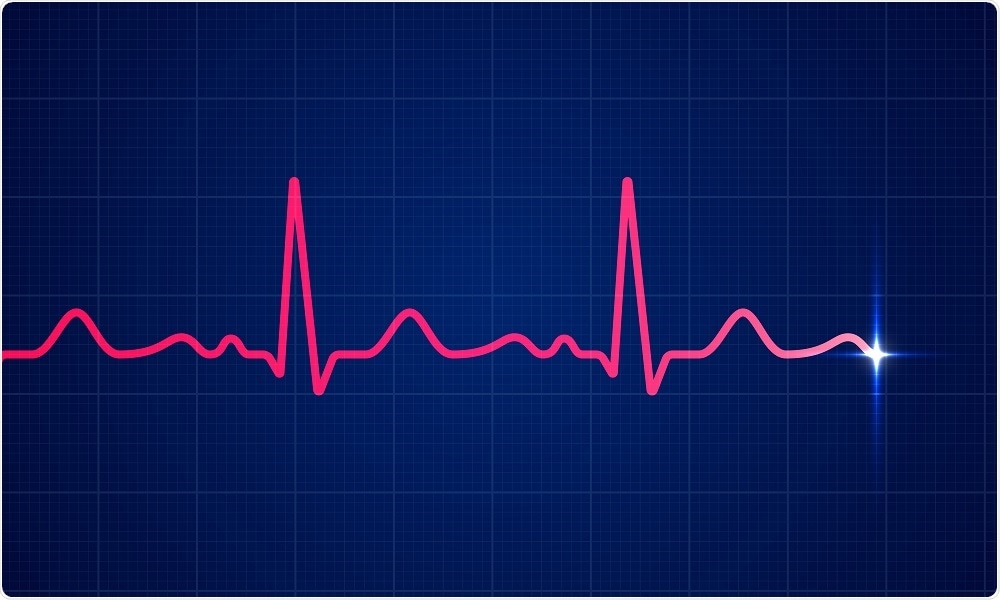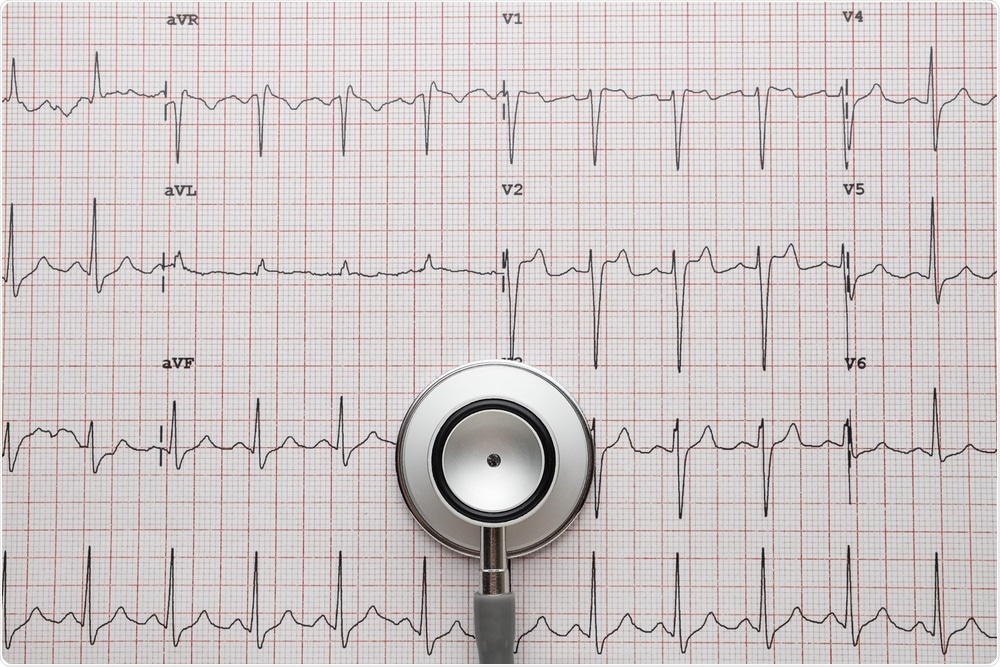
Diagnosing Atrial Fibrillation in 30 Seconds
 insights from industryGlyn BarnesMarketing DirectorAliveCor
insights from industryGlyn BarnesMarketing DirectorAliveCorAn interview with Glyn Barnes, Marketing Director for AliveCor, about Kardia Mobile and the Kardia Band, the FDA approved devices which can provide a diagnostic quality ECG reading in 30 seconds.
 Image Credit: Avector / Shutterstock
Image Credit: Avector / ShutterstockWhy is it important to monitor your heartbeat regularly if you think you may have Atrial Fibrillation (AFib)?
If a doctor or nurse suspects that you may be suffering from atrial fibrillation or AFib, you will typically undergo two tests. Firstly, a simple pulse check which looks for an irregular heartbeat. If this is found to be positive, a patient may undergo a 12 lead ECG and then be given a 24 hour ECG monitor to wear at home.
A healthy ECG has a particular shape, denoted by the letters PQRST. The P wave is a small bump at the start of the trace. Typically, in a patient with AFib, this wave is missing.
A missing P wave, combined with an irregular heartbeat, is a strong indication that AFib is present. Doctors also use a scoring system to test how likely you are to have the condition.
Irregular electrical pulses in the upper chambers of the heart (atria) are characteristic of AFib and they prevent the heart from contracting properly. This can cause blood to pool in these chambers, which in turn increases the risk of clot formation.
If these clots break away from the heart, they pass quickly into the connecting large blood vessels. From there, they can travel upwards and lodge in the narrower vessels of the brain. This causes ischemia (a lack of oxygen to the tissue) and thus a stroke.
Strokes of this magnitude can be debilitating for patients, who often fail to make a full recovery assuming they survive the initial event.
Hence, monitoring your heartbeat regularly is highly important if you have (or are at risk of) AFib.
What is Kardia Mobile, and how does it work?
Kardia Mobile is a miniature clinical-grade ECG device that can be used to monitor the electrical activity of the heart and it works with most smartphones and tablets. Typically, an ECG involves attaching wires and electrodes to your body in a clinical setting.
The Kardia Mobile has only two of these electrodes, which are encompassed within a slimline device that’s smaller than a credit card.
When you feel your heart behaving unusually such as beating faster than normal or exhibiting palpitations, all you need do is activate the app on your phone and place fingers from each hand of the electrodes. The app then counts down 30 seconds after which, the device will have completed an ECG recording.
The results of your ECG are automatically analyzed, and if AFib is present, you will be notified by the app immediately.
You can then instantly email the results to your doctor or nurse. As the recording is of diagnostic quality, they can confirm the diagnosis of AFib upon receipt. You may then be given medication such as an anticoagulant, which will dramatically reduce your risk of stroke and could save your life.
One of the challenges with atrial fibrillation is that can be what’s known as paroxysmal, or intermittent. You may only have an event once a fortnight for example, which makes it incredibly difficult for doctors and nurses to make a diagnosis.
It is not very often that a patient has an episode of AFib whilst in the hospital at an appointment, so a diagnosis of AFib can take months or even years to make. During this time, you are five times more likely to have a stroke than a person of a similar age who doesn't have AFib.
AFib is a huge health concern. It’s the most commonly diagnosed arrhythmia and places a heavy financial burden on health services. In England alone, the AFib costs the NHS £2.2bn per year, once you add in the after-care costs for patients who’ve had a stroke.
We're not by any means replacing the ECG machines used in hospitals, as they provide a much greater amount of information than Kardia does. However, the Kardia Mobile is a fantastic low-cost device that enables patients to carry out an ECG anytime and anywhere.
You might be on the London underground, or in a supermarket, and you can take a real-time measurement of your heart’s activity, capturing events as they happen.
What is the Kardia Band, and how does it differ from Kardia Mobile?
The Kardia Band is a watch strap for the Apple Watch that allows you to take an ECG measurement. This displays on the screen of the watch as you use it. There’s a small, square sensor in the middle of the strap that’s double-sided.
When you need to take an ECG measurement, you place your right thumb on the top sensor and ensure that the bottom of the sensor is touching the skin on your left arm, as it should be when you are wearing the watch. From here, you will see a diagnostic quality ECG reading scrolling across the watch screen.
Like Kardia Mobile, a measurement using Kardia Band takes just 30 seconds and can be sent straight to your GP or cardiologist.
The added benefit of the Kardia Band is that it can be used to monitor your heart rate all day, and from this it makes predictions using AI about what your heart rate should be, relative to your current activity.
For example, if I’m busy and running between meetings in London, my heart rate should be higher than normal. However, if I’m sat at home having a cup of coffee and suddenly my heart rate spikes, the app will detect that, and prompt me to do an ECG there and then.
How is the technology useful for patients with conditions such as heart palpitations?
When Kardia Mobile and the Kardia Band were first launched, we focused on patients with AFib. However, it very quickly became apparent that the product could be used to monitor several other arrhythmias.
For example, when it comes to heart palpitations, we know that the vast majority of patients (80-85%) have nothing wrong with them. They are just experiencing normal palpitations that can be brought on by stress or too much coffee.
For these patients, being able to purchase a low-cost device such as the Kardia Mobile can give them piece of mind, while reducing the burden on the healthcare service.
They can then take the recordings to their GP, who, once confirmed ‘normal’ can reassure the patient and tell them that there is nothing to worry about. This can help to free up time for cardiologists and help to reduce waiting times for appointments.
 Image Credit: catshila / Shutterstock
Image Credit: catshila / ShutterstockIt is clear that Kardia Mobile and the Kardia Band will help patients identify when their heartbeat is irregular, but how will it help clinicians?
More and more doctors are becoming interested in employing the Kardia Mobile in their clinics, and they’re also finding new uses for the devices. Some clinics are using the device to screen patients at routine appointments, whereas others are loaning it to patients so that they can capture the data they need to make a diagnosis.
The devices can also be used to monitor patients after surgery. For example, patients with AFib will sometimes undergo a procedure called ablation, where a wire is passed into the atria of the heart and, using heat or freezing, creates more direct channels of electrical activity. This helps the atria to contract properly and therefore blood to flow freely.
The procedure isn’t always successful, and it’s important to be able to detect this early. Even after a successful procedure, the symptoms of AFib may return with time. Some doctors now monitor their patients' post ablation using KardaiMobileto check their progress.
A different and creative example of a hospital clinician using the device was an anesthetist. Sometimes, patients arriving in theatre are discovered to have an arrhythmia when hooked up to the monitor.
The case may then be canceled, causing unnecessary stress on the patient and wasting valuable operating time. So, this doctor now uses the Kardia Mobile to carry out ECG’s on every patient before they go down to theatre, saving time and resources.
Where can readers find more information?
About Glyn Barnes
 Glyn has spent over twenty-five years working in the medical device industry holding senior roles in companies such as GE Healthcare and Spacelabs. With a passion for healthcare technology, he believes significant changes are underway with the provision of care in this country.
Glyn has spent over twenty-five years working in the medical device industry holding senior roles in companies such as GE Healthcare and Spacelabs. With a passion for healthcare technology, he believes significant changes are underway with the provision of care in this country.‘The NHS understands that we have to look at new technologies, empowering patients to be involved with their own care, and ultimately achieving efficiencies in the process. I joined AliveCor as I could see the company had developed exciting new devices to match this need and current product developments will further enhance our offering to the market.’
Sponsored Content Policy: News-Medical.net publishes articles and related content that may be derived from sources where we have existing commercial relationships, provided such content adds value to the core editorial ethos of News-Medical.Net which is to educate and inform site visitors interested in medical research, science, medical devices and treatments.


































No hay comentarios:
Publicar un comentario